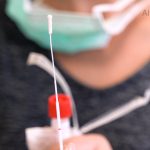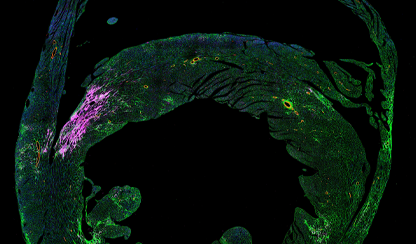The COVID-19 response continues, with a drug that may help speed recovery and a major study following those with ongoing symptoms; experts back Victorian restrictions, provide a reliable source of information to patients, and sound a warning on mental health in prisons. In other news, the discovery of new heart cells could unlock the key to fighting heart failure, important analysis links the use of aspirin to gastrointestinal bleeding in the elderly, a major HIV preventative study for females gains international support, and a new Head of Neuroscience is appointed at Monash. Here’s just some of what has happened this week across the Alfred Research Alliance.
ALFRED HEALTH & MONASH CENTRAL CLINICAL SCHOOL
New COVID Drug Trial Could Help Speed Recovery
 Researchers from The Alfred and Monash University have set out to determine whether an antiviral medication that has activity against COVID-19 could help people recover from the illness. Led by infectious diseases physician Dr James McMahon, the VIRCO trial is currently enrolling symptomatic people with COVID-19 in the first five days of diagnosis, to trial an antiviral called Favipiravir, to see if it will help them clear the virus from their systems faster. Read more… or find out how to take part in the trial.
Researchers from The Alfred and Monash University have set out to determine whether an antiviral medication that has activity against COVID-19 could help people recover from the illness. Led by infectious diseases physician Dr James McMahon, the VIRCO trial is currently enrolling symptomatic people with COVID-19 in the first five days of diagnosis, to trial an antiviral called Favipiravir, to see if it will help them clear the virus from their systems faster. Read more… or find out how to take part in the trial.
Leading MS Researcher New Head of Neuroscience at Monash
 Monash University and Alfred Health are delighted to announce the appointment of Prof Helmut Butzkueven (pictured) to the joint position as The Van Cleef Roet Chair of Neuroscience and Head of the Department of Neuroscience, Monash University, and Director of Neurology, Alfred Health. Professor Butzkueven is an outstanding Neurologist and Clinician-Scientist, who is an international leader in translational research into Multiple Sclerosis. Read more…
Monash University and Alfred Health are delighted to announce the appointment of Prof Helmut Butzkueven (pictured) to the joint position as The Van Cleef Roet Chair of Neuroscience and Head of the Department of Neuroscience, Monash University, and Director of Neurology, Alfred Health. Professor Butzkueven is an outstanding Neurologist and Clinician-Scientist, who is an international leader in translational research into Multiple Sclerosis. Read more…
MONASH PUBLIC HEALTH & PREVENTIVE MEDICINE
New Study to Track Australian COVID-19 Survivors After Hospital Discharge
 Prof Carol Hodgson, a Monash SPHPM researcher and ICU specialist at The Alfred, has been working at the epicentre of the Victorian outbreak. Now she is leading a new study to help Australia prepare to meet the needs of COVID-19 patients whose serious health symptoms persist long after they have been discharged from hospital. Read more…
Prof Carol Hodgson, a Monash SPHPM researcher and ICU specialist at The Alfred, has been working at the epicentre of the Victorian outbreak. Now she is leading a new study to help Australia prepare to meet the needs of COVID-19 patients whose serious health symptoms persist long after they have been discharged from hospital. Read more…
Aspirin Use Linked to Gastrointestinal Bleeding in Elderley
 A new study analysing data from the landmark ASPREE trial has found that prolonged daily aspirin use increases the risk of gastrointestinal (GI) bleeding by at least 60 per cent in healthy people aged 70 and over. The study, led by Dr Suzanne Mahady and published in top gastroenterology journal Gut, followed 19,114 participants over almost five years and recorded 264 incidents of major GI bleeding. Read more…
A new study analysing data from the landmark ASPREE trial has found that prolonged daily aspirin use increases the risk of gastrointestinal (GI) bleeding by at least 60 per cent in healthy people aged 70 and over. The study, led by Dr Suzanne Mahady and published in top gastroenterology journal Gut, followed 19,114 participants over almost five years and recorded 264 incidents of major GI bleeding. Read more…
New Article Provides Certainty for Australian COVID-19 Patients

Hundreds of Australians are diagnosed with COVID-19 each day, yet finding reliable information can be difficult. With so much information – and misinformation – swirling around the internet and the media, an article by Monash SPHPM’s A/Prof Julian Elliott (pictured) who heads up the National COVID-19 Clinical Evidence Taskforce, clearly explains what Australians with COVID-19 can expect as they progress through the disease. Full article here.
BAKER HEART AND DIABETES INSTITUTE
New Heart Cells Discovered
 Scientists creating an ‘atlas’ of the cells in the heart have discovered two new cell types that may be the key drivers of heart failure. Dr Alex Pinto, lead author of a new paper, published in leading cardiovascular journal Circulation says the findings identify ‘clear targets’ to aim for to stop heart failure and also provides important information on the differences between male and female hearts.. Read more here
Scientists creating an ‘atlas’ of the cells in the heart have discovered two new cell types that may be the key drivers of heart failure. Dr Alex Pinto, lead author of a new paper, published in leading cardiovascular journal Circulation says the findings identify ‘clear targets’ to aim for to stop heart failure and also provides important information on the differences between male and female hearts.. Read more here
BURNET INSTITUTE
Reproduction Number Key to Reducing Victoria’s COVID Caseload
 With metropolitan Melbourne in Stage 4 lockdown, Burnet Institute Deputy Director, Prof Margaret Hellard AM (pictured) has urged the community to cooperate with restrictions, telling The Age newspaper that Burnet Institute analysis showed Stage 3 restrictions had already seen the reproduction ratio – the R number – fall from 1.75 at the start of July, to 1.16 at the end of the month, and enhanced restrictions could potentially drive that number below one, leading to a much-anticipated decline in case numbers. Read more…
With metropolitan Melbourne in Stage 4 lockdown, Burnet Institute Deputy Director, Prof Margaret Hellard AM (pictured) has urged the community to cooperate with restrictions, telling The Age newspaper that Burnet Institute analysis showed Stage 3 restrictions had already seen the reproduction ratio – the R number – fall from 1.75 at the start of July, to 1.16 at the end of the month, and enhanced restrictions could potentially drive that number below one, leading to a much-anticipated decline in case numbers. Read more…
Female HIV Preventative Project Receives International Support

A Burnet-led project has been awarded a major philanthropic grant for its research into HIV prevention methods for sexual transmission in females. The Enhancing the Vaginal Environment-Microbiome (EVE-M) initiative, led by Prof Gilda Tachedjian, will use the grant from The Campbell Foundation to formulate an intravaginal gel, which is designed to dampen genital inflammation in women who are colonised with harmful vaginal microbiota. Read more…
Protecting Mental Health in Prisons During COVID-19
 Burnet researchers are calling on state and federal policymakers to consider the mental health of people in prison in their responses to COVID-19. In a letter to the editor of the Australian & New Zealand Journal of Psychiatry (ANZJP), Burnet Head of Public Health Prof Mark Stoové, and Burnet Research Assistants, Ashleigh Stewart and Reece Cossar, expressed concern, saying “custodial settings have seen an emergent emphasis on physical distancing and quarantining [and] pose a significant risk for people with mental illness.” Read more…
Burnet researchers are calling on state and federal policymakers to consider the mental health of people in prison in their responses to COVID-19. In a letter to the editor of the Australian & New Zealand Journal of Psychiatry (ANZJP), Burnet Head of Public Health Prof Mark Stoové, and Burnet Research Assistants, Ashleigh Stewart and Reece Cossar, expressed concern, saying “custodial settings have seen an emergent emphasis on physical distancing and quarantining [and] pose a significant risk for people with mental illness.” Read more…
